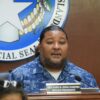2011 again?
RECENTLY, lawmakers have passed several spending measures funded by fees and/or taxes paid by IPI which is now buried in debt — and lawsuits over unpaid debts and other financial obligations. In short, a significant government funding source is gone. It may also take some time before the local tourism industry can fully recover, and this will further reduce the government’s revenue collection especially once it has spent the ARPA funds from the feds.
And when that happens how can the CNMI government meet its many never-ending obligations? Settlement Fund and bond payments are obligatory. The 25% for retirees is not. But retirees — and their family members — are voters. Ditto “nonessential” government employees of government offices and programs many of which are duplicative, overlapping or useless.
And when elected officials say there’s a need for “revenue-generating measures,” they usually mean taking other people’s money which, in this bad economy, is already in short supply.
It could be 2011 again for the CNMI. That was the year when the House passed a $102 million budget for government operations even though key House members admitted that they would be “lucky” to collect $95 million. And this was before the CNMI government was mandated by the federal court to make hefty annual pension payments ($39 million in FY 2023) to the retirees through the NMI Settlement Fund.
On Capital Hill, in this election year, it seems that no one wants to publicly discuss at length and in detail these two most pressing issues — the government’s precarious financial condition and the dismal state of the local economy — and how to deal with them without imposing more hardship on members of the public.
Rebuild how?
IN the past, the CNMI economy improved tremendously because of 1) a significant increase in visitor arrivals, and 2)the entry of major investors.
The Covid-19 pandemic has not made things easier for the CNMI which also has to compete with other islands and countries for the same tourists and investors.
Why should tourists visit the CNMI and not, say, Guam or Palau or Fiji? Why should businesses invest here and not in other jurisdictions with more flights to and from the world’s major cities; with better and more dependable infrastructure and communications system; with a larger workforce and a friendlier business climate?
To quote one of the few legitimate honest-to-goodness big investors still on island, “There aren’t many people interested in coming in to invest.”
So when you hear politicians talk about “rebuilding the economy,” ask them to be more specific.
Remember the fiscal response task force?
OVER two years ago, shortly after the CNMI imposed severe (and economy-killing) Covid-19 restrictions, the Torres-Palacios administration created a fiscal response task force with the assistance of Graduate School USA and the Interior Department. According to the task force’s briefing paper, “It is apparent to all concerned parties that the CNMI is facing an unprecedented fiscal and economic crisis.”
True then, true now — especially once we run out of ARPA funds.
Among the task force’s major recommendations:
• Reduce government work-hours.
• Reduce number of government personnel.
• Cancel/postpone the retirees’ 25% benefit.
• Reduce medical referral costs.
• Increase taxes and fees.
These are mathematically sound proposals — but politically fatal to those who would dare recommend them in an election year.
And that’s why politicians would rather talk about something else.










